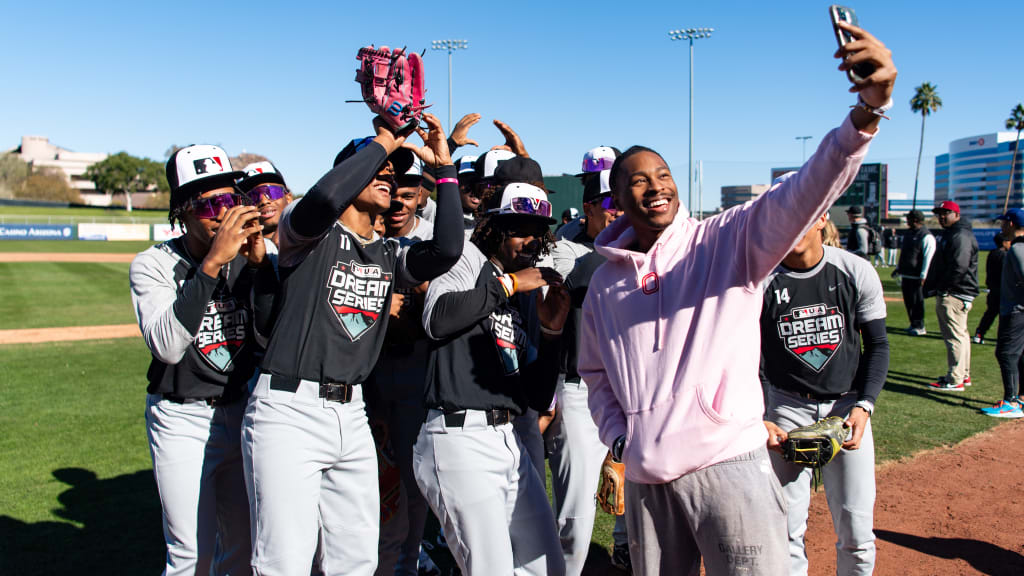TEMPE, Ariz. -- For a significant portion of the conversations surrounding the positive emotions and optimistic outlook at the seventh iteration of MLB’s DREAM Series, there’s been a consistent conceit that’s risen to the minds of instructors and participants, rooted in an old proverb that’s reverberated through generations of Black households -- It takes a village.
It’s seen in the way that figures like former pitcher Marvin Freeman and outfielder Marquis Grissom fill with pride when they talk about the legion of retired players who returned to help guide the next generation. But while pulling off an event of this magnitude is a comprehensive team effort with a lot of moving parts, there’s a common name that’s spoken with reverence at the DREAM Series, the man seen as the driving force for originating the event prior to 2017.
“Everything that Tony Reagins has put out through this program, it’s unbelievable,” Grissom said. “I’m just happy to be a part of it.”
Reagins, who holds the role of MLB chief baseball development officer and joined the Commissioner’s Office in 2015, has been instrumental in aiding the proliferation of events like the Breakthrough Series development camps and PLAY BALL initiatives across the world. The specific idea for the DREAM Series was born in the midst of the gradual decline of Black participation, sprouting from an interview that legendary pitcher Dave Stewart did with USA Today in 2016, noting that “Black pitchers have almost become extinct.”

“I heard that interview and just wanted to do something about it,” Reagins said. “And we came up with the concept of taking Black pitchers and catchers at the high school level, bringing them into an environment where we can develop them at a faster pace.”
The DREAM Series arose with a hyperfocus on creating a space for more Black pitcher and catcher batteries to exist. There’s a laundry list of people that Reagins could cite as catalysts for helping the event progress from the very outset -- namely former manager Jerry Manuel, who Reagins credits for putting together a staff of instructors that are dedicated to the advancement of Black players. It has since evolved into including position players as well, with a collective aim toward ensuring that these elite high school players feel prepared for not only their upcoming seasons, but for the life that follows in the years after.
From the very beginning, this event has been forging on with an emphasis on helping each kid achieve whatever dream that rests in their head. There’s the visualization aspect, which Reagins cites of great importance, bringing the participants together to stay at a big league hotel and use big league facilities to the greatest extent.
But of equal importance are the dates that the DREAM Series falls on each year -- Martin Luther King Jr. weekend, which honors the life and work of the transcendent civil rights activist.
“We wanted to give these kids an opportunity,” Reagins said. “So, why MLK weekend? Obviously, the namesake of the ‘I Have a Dream’ speech, and just every impact that he had on the world, especially before his death at age 39.”
There’s an intrinsic elevation in importance when you tie an event to a civil rights leader of King's status, especially when it exists to honor his impact by furthering a sliver of the work he fought for. It fills each instructor and player with a sense of pride, with the feeling that they’re carrying on his dream by existing, living with freedom and joy.
Then, there was the decision to host the event at the Angels’ Spring Training facility in Tempe. Part of the choice was informed by Reagins’ relationship with the organization, where he spent several years as the director of player development and the team’s general manager for multiple seasons (he was named the Rube Foster American League Executive of the Year in 2008).
But, the decision to plant a flag in Arizona, one of the last states to recognize MLK Day in the United States in 1993 after the legislature voted against adhering to the national law in ‘86, was pointed and precise. To create a beacon for the future of Black baseball in a state where Black history was purposely ignored and set by the wayside for many years, is just another manner that Reagins and rest of the creators of the DREAM Series are working to remind Black high school players that they belong anywhere in the sport, and in the country.
“The history of MLK Day, it wasn’t always promising,” Freeman said. “We’re working to flip that narrative and change the light. We’re trying to get it out in front of people more, so they can really understand the significance of what he did for this country. How he helped the civil rights movement and tried to push things in a better direction for us all.”
Reagins and the rest of the originators understand that the DREAM Series is not the endpoint of years of progress -- it’s another data point that’s working to decrease the opportunity gap for minority ballplayers. And after seven years, they’re still just as motivated to help as many athletes as they can, armed with more experience and lessons each year.
They know that it’s not just about the grand victory at the end of the road, but the wins that they accumulate in the aggregate that mean just as much.
“I think that is what’s most important -- you have to appreciate the moment, right?” Reagins said. “We all want a gazillion guys from these programs to get to the big leagues. But it’s not easy and it’s a journey. … It’s about trying to position these guys to get these opportunities, because from an ability standpoint, they can all do it. Absolutely.”
